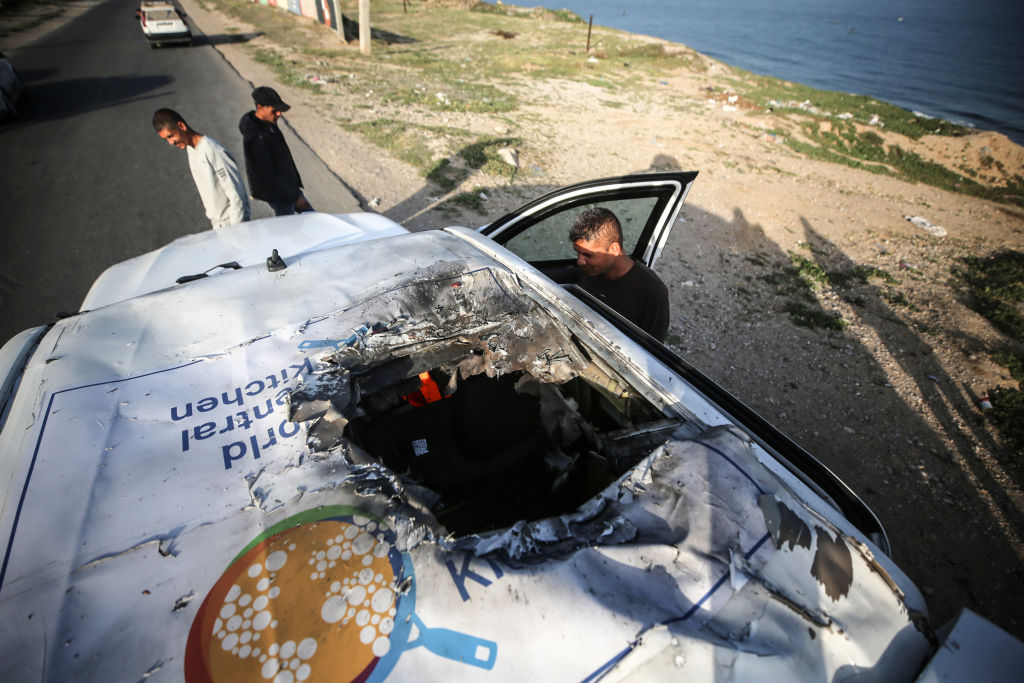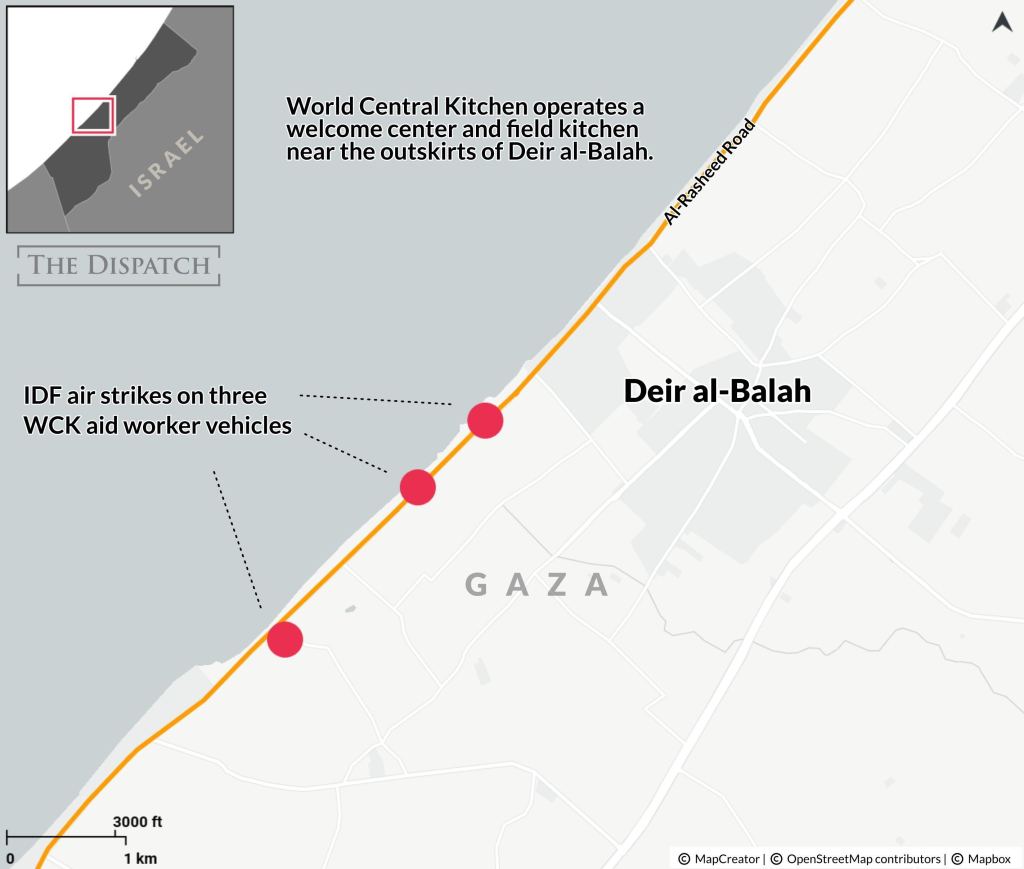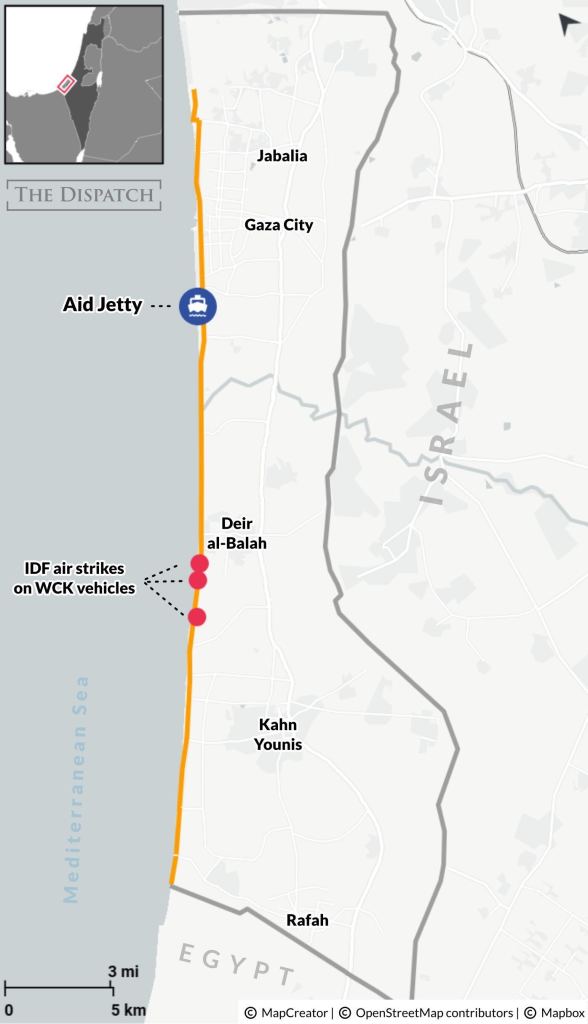Happy Monday! To those of you in the path of today’s solar eclipse, check here for information about when the show starts in your area. As a reminder to no one in particular, be sure not to look at the sun without eye protection!
Quick Hits: Today’s Top Stories
- Tens of thousands of protesters gathered in Tel Aviv and other major Israeli cities on Saturday, calling for elections and a deal to secure the release of the hostages held in Gaza as the country marked six months since Hamas’ October 7 attack over the weekend. On Saturday, the Israel Defense Forces (IDF) recovered the body of Elad Katzir, a 47-year-old farmer taken hostage on October 7. According to IDF intelligence, Katzir was killed in captivity by Islamic Jihad, a terrorist organization allied with Hamas in Gaza. “He could have been saved if there had been a deal in time,” Katzir’s sister claimed, denouncing the Israeli government. “But our leadership are cowards, motivated by political considerations, and thus it did not happen.” An estimated 95 hostages are still alive in Gaza today, as ongoing negotiations to secure their release fail to yield a breakthrough.
- The IDF announced on Sunday the withdrawal of most of its ground troops from southern Gaza after several months of fighting in the Khan Younis area. Israeli military officials suggested the move, which leaves just one brigade in the enclave, was in preparation for operations in the southernmost city of Rafah. “The troops exit and prepare ahead of their follow-up missions,” Israeli Defense Minister Yoav Gallant said yesterday. Meanwhile, Israeli and U.S. officials are on alert for a potential Iranian attack in the wake of the alleged Israeli strike in Damascus, Syria, last week that killed three senior Iranian Islamic Revolutionary Guard Corps (IRGC) commanders and four IRGC officers.
- Two Russian strikes in Kharkiv, Ukraine, killed eight civilians and injured at least 10 others early Saturday morning, regional authorities said. Ukraine’s military indicated that Ukrainian forces had intercepted some but not all of the drones and missiles used in the strike, but Ukrainian President Volodymyr Zelensky said in an interview on Friday that the country is running low on missile defenses. “If they keep hitting [Ukraine] every day the way they have for the last month, we might run out of missiles, and the partners know it,” he said, noting that the military is already having to decide what areas to protect.
- Mexico suspended diplomatic relations with Ecuador on Saturday after Ecuadorian authorities raided the Mexican embassy in Quito, Ecuador, on Friday to arrest Jorge Glas, the former vice president of Ecuador. Glas—who had been convicted on bribery charges in Ecuador and faced prison time—had been staying at the embassy since December and on Friday, the Mexican government granted him asylum, prompting Ecuador’s raid just hours later. United Nations officials and countries throughout the region—including Brazil, Argentina, and Uruguay—condemned Ecuador’s actions as violating diplomatic norms, and Nicaragua joined Mexico in cutting diplomatic ties with Ecuador.
- Populist Peter Pellegrini was elected president of Slovakia over the weekend with 53 percent of the vote. A member of the Hlas (Voice) party and sympathetic to Russia, Pellegrini beat out Ivan Korčok, a former foreign minister and staunch supporter of Ukraine. Though the role of president is largely symbolic, Pellegrini’s victory bolsters Hlas Prime Minister Robert Fico, who leads the government’s ruling coalition and has drawn the country closer to Russia.
- Tens of thousands of people marched in Budapest, Hungary, on Saturday to protest Hungarian Prime Minister Viktor Orbán’s government. Péter Magyar, a former diplomat who was once a senior member of Orbán’s Fidesz party, organized the demonstration and has presented himself as a changemaker with plans to challenge Orbán in upcoming European parliament elections this summer. The rising opposition figure has promised to root out corruption and repair ties with the European Union—of which Hungary is a member—if elected.
- The Bureau of Labor Statistics reported Friday that U.S. employers added 303,000 jobs in March—up from 270,000 in February and far exceeding economists’ expectations. The healthcare and government sectors accounted for 143,000 of the new jobs. The unemployment rate ticked down slightly from 3.9 percent to 3.8 percent, while the labor force participation rate increased from 62.5 percent in February to 62.7 percent last month. Average hourly earnings—a measure the Federal Reserve is watching closely in its fight against inflation—rose 0.3 percent month-over-month in March, and 4.1 percent year-over-year. Those figures were 0.2 and 4.3 percent in February, respectively.
- A 4.8-magnitude earthquake struck New Jersey on Friday morning, with tremors felt from Baltimore to Boston. The quake caused little damage and resulted in minor transit disruption at some airports throughout the region.
- The South Carolina Gamecocks beat the Iowa Hawkeyes 87-75 on Sunday to win the NCAA Women’s Basketball championship. In her last game as a college player, Iowa’s Caitlin Clark scored 30 points and set a championship record in the first quarter for the most points by a single player in a single period. On the men’s side, the Purdue Boilermakers will face off against the University of Connecticut Huskies for the championship tonight at 9:20 p.m. ET.
Tragic Incident Complicates U.S.-Israel Relations

Around 11 p.m. local time last Monday, seven aid workers employed by World Central Kitchen (WCK)—an NGO that provides food aid in times of disaster and war—set off along a coastal road used to deliver aid in the central part of the Gaza Strip. They’d been part of a convoy transporting 100 tons of food aid that had arrived at a recently built pier to a warehouse in Deir el-Balah. After unloading at the warehouse, they headed south in three SUVs.

By 11:15 p.m., Israeli forces had ordered three drone strikes—in error—that killed all seven workers.
The Israel Defense Forces (IDF) quickly admitted culpability for the strikes, dismissing two officers after an investigation—the results of which it released Friday—showed the soldiers operating the drones fired in violation of the IDF’s standard operating procedures following a misidentification. The aid workers’ tragic deaths also set in motion a chain of events that culminated in dramatic policy change from both the Israeli War Cabinet and the Biden administration, which could potentially open additional avenues for aid to reach civilians in Gaza. The strike also illustrated how difficult it is for humanitarian groups to safely operate during a war that has repeatedly seen Hamas use civilians as human shields.
WCK, founded by celebrity chef José Andrés, has operated in crisis areas around the world since the aftermath of the 2010 Haiti earthquake. Just last month, the group began bringing food aid into Gaza by ship from Cyprus on a jetty it helped construct out of rubble. It was aid from one of those ships that the WCK team was delivering Monday night. On Tuesday, the group formally announced the death of that team—an Australian, three Britons, a U.S. and Canadian dual citizen, a Pole, and a Palestinian driver—and pointed the finger at the IDF, adding that it had paused its activities in Gaza indefinitely.
On Tuesday, the IDF’s chief of staff, Lt. Gen. Herzi Halevi, and Prime Minister Benjamin Netanyahu both confirmed that the IDF had “unintentionally” fired on the team. With the admission came a wave of international condemnation. Andrés suggested that saying the strike was a “mistake” was insufficient. “This was not just a bad luck situation where ‘oops’ we dropped the bomb in the wrong place,” he told Reuters on Wednesday.
Biden, in one of his most strident criticisms of the U.S. ally with which his administration has been increasingly at odds, said he was “outraged and heartbroken” by the workers’ deaths. He then doubled down, saying the incident represented a pattern in the Israeli government’s behavior. “Israel has not done enough to protect aid workers trying to deliver desperately needed help to civilians,” he said. “Incidents like yesterday’s simply should not happen. Israel has also not done enough to protect civilians.”
Hamas has—by its own admission—used civilians as human shields, including by constructing tunnels under civilian infrastructure like schools and hospitals and viewing the potential for high civilian casualties as a strategic advantage. “[This] puts an added burden on Israel while they go after Hamas,” Biden told reporters last year, referencing the terrorist group’s “despicable” and “cowardly” behavior.
It’s difficult to know for certain how many civilians have been killed in the six months since Israel declared war on Hamas following the terrorist group’s October 7 attack. While it’s likely the number of civilians dead is well into the thousands, most estimates come from the Hamas-run Gaza Health Ministry, which does not distinguish between combatants and civilians in its casualty count. Analysis from the Washington Institute for Near East Policy—a D.C.-based, pro-Israel think tank—suggests the Hamas count may overestimate the proportion of children among the dead while underestimating the share of adult men in the total death toll. Biden and National Security Council spokesman John Kirby have both said the Hamas reports are unreliable. The WCK workers were the first confirmed international humanitarian workers to be killed, though more than 100 local aid workers have reportedly died during the war.
WCK had cleared its movements with the IDF as the seven workers moved from the aid jetty to the warehouse and onto a staging area further south from there. But the IDF’s investigation revealed that the details of the humanitarian group’s plans never made their way down through the chain of command to the drone operators on duty that night or their superiors—one of several compounding mistakes that led to Israeli forces firing on the three vehicles. “The strike on the aid vehicles is a grave mistake stemming from a serious failure due to a mistaken identification, errors in decision-making, and an attack contrary to the Standard Operating Procedures,” the IDF’s report read.

IDF officials said the “mistaken identification” occurred when the drone operators, tracking the convoy from the jetty, thought they saw at least one armed person—whom they believed to be a Hamas terrorist—join the convoy. When the three cars left the warehouse, the IDF soldiers believed they were Hamas vehicles, something Rear Adm. Daniel Hagari, an IDF spokesman, called an “operational misidentification and misclassification.” Though the vehicles were marked with the WCK logo on their roofs, investigators said Friday that the drone’s camera couldn’t make out the logos in the dark.
Operating under the belief that Hamas terrorists were driving the convoy—based on the misidentification of a single individual, which the IDF officials said failed to meet its standard to open fire—IDF forces fired on the first car at 11:09 p.m. When some of the workers emerged injured from the car and moved to the other cars in the convoy, IDF soldiers fired again on the second car at 11:11 p.m. and on the third car for the final time at 11:13 p.m. IDF officials said the decision to fire on the second and third vehicles after people began running to them was also against its standard operating procedures.
The IDF dismissed two officers—a major and a colonel in reserve—and reprimanded the brigade and division commanders as well as the commander of Israel’s Southern Command for his “overall responsibility.” The IDF’s publicly released summary report made no mention of legal culpability.
Hagari also promised that the IDF has made “significant” changes to its procedures “effective immediately,” without offering specifics. Any change, though, could have tradeoffs even without completely eliminating the risks of a similar mistake. “I don’t think there’s a way you can guarantee you are going to avoid [a mistake], but you can make it less likely by making attack decisions subject to more restrictive target verification standards,” said Geoffrey Corn, director of the Center for Military Law and Policy at the Texas Tech University School of Law and a fellow at the Jewish Institute for National Security of America. “Every time you make a target verification standard more demanding, you forfeit some tactical advantage.”
The swift statements of culpability from the IDF and Israeli government—and the subsequent investigation—represent a remarkable effort at reconciliation by a military. Indeed, even U.S. military officials initially defended an August 2021 drone strike in Kabul, Afghanistan, that killed 10 civilians—seven of which were children—after military personnel targeted a car they mistakenly believed was loaded with explosives, acknowledging the error more than two weeks later. As the New York Times reported at the time, “Almost everything senior defense officials asserted in the hours, and then days, and then weeks after the Aug. 29 drone strike turned out to be false.”
Despite the IDF’s rapid reaction, WCK’s representatives questioned the independence of the inquiry. “The IDF cannot credibly investigate its own failure in Gaza,” the group said.
Israel had already begun to feel the geopolitical repercussions of the strike before the results of the investigation were fully known. Biden and Netanyahu spoke on the phone on Thursday, and by many accounts, the conversation was tense—and seemed to put conditions on U.S. support for Israel. “[Biden] made clear the need for Israel to announce and implement a series of specific, concrete, and measurable steps to address civilian harm, humanitarian suffering, and the safety of aid workers,” the White House summary of the call read. “He made clear that U.S. policy with respect to Gaza will be determined by our assessment of Israel’s immediate action on these steps.” More than three dozen members of Congress, including former House Speaker Nancy Pelosi, signed a letter over the weekend asking the president to cut off arms shipments to Israel.
By Thursday evening, the Israeli War Cabinet had announced it was opening up additional channels for aid to enter Gaza. It vowed to reopen the Erez crossing in northern Gaza—which Hamas attacked on October 7—and increase the number of aid trucks coming in from Jordan through the Kerem Shalom crossing where the borders of Egypt, Israel, and Gaza meet. Israeli officials also said it would use Ashdod port, south of Tel Aviv, as a hub to bring in additional aid. “This increased aid will prevent a humanitarian crisis and is necessary to ensure the continuation of the fighting and to achieve the goals of the war,” Netanyahu’s office said.
While an increased volume of aid could be helpful in addressing the growing need, aid distribution could ultimately prove to be the more pressing dilemma. WCK and several other aid organizations have suspended operations in Gaza, citing concerns they cannot perform their work safely. But that makes distributing the aid that does arrive in Gaza—already a dangerous endeavor as civil order breaks down—even more difficult. One solution would be for the IDF to take ownership of such distribution. “From my standpoint, I think the Israelis really need to own the humanitarian situation [in Gaza],” said Raphael Cohen, a senior political scientist at the RAND Corporation and lieutenant colonel in the U.S. Army Reserve. “And that means if you’re bringing in large quantities of humanitarian aid, you have an Israeli escort with them doing that coordination on the ground such that, if there’s a question of, ‘Is this a Hamas convoy or an aid convoy?’ there’s someone on the ground saying, ‘This is who we say it is.’”
But it’s the very dynamics of the conflict of Hamas—an enemy that deliberately hides among civilians—that makes even that effort to manage an increasingly chaotic aid landscape a dangerous catch-22. “That uniform that the Israelis wear in Gaza doesn’t make them invisible,” Corn, the military law expert, told TMD. “It makes it easier for Hamas to figure out who to shoot. … You want the protection of international law? You have to accept risk. And that risk is manifest by wearing a distinctive uniform and it’s all part of a broad mosaic that’s intended to mitigate the risks to the civilian population.”
“Who is the only winner from this tragedy—who’s the only winner?” Corn asked. “Definitely not [World Central Kitchen]. Definitely not their people. Definitely not the Israelis. [It’s] Hamas.”
Worth Your Time
- Saturday marked the 30th anniversary of the start of the Rwandan genocide. Paul Rusesabagina—the Hotel Rwanda hotelier who sheltered more than 1,200 people during the genocide—was released from Rwandan prison last month and reflected on the brutal past and troubled present of his country for the New York Times. “For me and for so many Rwandans, the 1994 genocide remains the focal point of my life,” he wrote. “The months of April to July 1994 were a time of incomprehensible horror, in which our beautiful country was dragged into hell by brutal violence and killings on a scale previously unimaginable. At some points in the crisis, as many as 10,000 people were butchered in a day, primarily by machetes and other crude weapons. … Now Rwanda is viewed by many nations as an important global partner—a partner that has bravely rebuilt itself into a thriving and inclusive modern society. But it is increasingly difficult to remain blind to the jailing—and even the disappearances and killings—of those who criticize or challenge the Rwandan government’s power. … This is not a reconciled or inclusive society; it is an authoritarian state.”
- Writing for the Los Angeles Review of Books, Melina Moe explored the sensitivity in the rejection letters famed novelist Toni Morrison wrote when she worked as an editor at Random House. “Regardless of destination, Morrison’s rejections tend to be long, generous in their suggestions, and direct in their criticism,” Moe wrote. “The letters themselves—generally one, two at most, exchanged with a given writer—constitute an asymmetrical archive. On one end of each communiqué is the ghost of a submitted manuscript (absent from the archive after being returned to the sender, although in some cases survived by a cover letter). On the other is a rejection from Morrison, sometimes brusque yet typically offering something more than an expression of disinterest—notes on craft, character development, the need for more (or less) drama. But also: Autopsies of a changing, and in many ways diminishing, publishing industry; frustrations with the tastes of a reading public; and sympathies for poets, short story writers, and other authors drawn to commercially hopeless genres.”
Presented Without Comment
CNN: [Republican] House Intelligence Committee Chair Says Russian Propaganda Has Spread Through Parts of GOP
House Intelligence Committee chair Mike Turner said Sunday that Russian propaganda has “absolutely” seeped its way to Congress, saying some of his Republican colleagues have repeated false claims on the chamber’s floor.
“It is absolutely true we see, directly coming from Russia, attempts to mask communications that are anti-Ukraine and pro-Russia messages, some of which we even hear being uttered on the House floor,” the Ohio Republican told CNN’s Jake Tapper on “State of the Union.”
Turner’s comments come after [Republican] House Foreign Affairs chair Michael McCaul told Puck News last week that Russian propaganda has “infected a good chunk” of the GOP base.
Also Presented Without Comment
Former House Speaker Kevin McCarthy: “The one thing I’ve always found about [Rep.] Marjorie [Taylor Greene] is she’s a very serious legislator that deals with policy.”
Toeing the Company Line
- The Dispatch Monthly Mailbag (🔒) is back, and this month, Wendy Lane Cook, our new deputy managing editor, has raised her hand to respond to reader questions. Members can submit questions for her—about her experience in local news, her Olympics coverage, her decision to move back to Texas, and more—in the comments here.
- In the newsletters: The Dispatch Politics crew reported on the demise of the nascent No Labels unity ticket, Nick explored (🔒) why No Labels failed to catch fire, Jonah argued against holding whole nations accountable for the actions of individuals, and Chris wrote that (🔒) polling shows Trump can’t win in November … but that Biden could lose.
- On the podcasts: Jonah ruminated on the state of the Federalist Society, Chef José Andrés’ reaction to the World Central Kitchen Deaths, No Labels, and more on the latest episode of The Remnant. Plus, former MSNBC host Mehdi Hasan joins Jamie for a spirited debate on the Israel-Hamas war on today’s episode of The Dispatch Podcast.
- On the site over the weekend: Kevin dissected Beyonce’s new “country” album and the capital-D discourse around it, Mathis Bitton reviewed Jason Blakely’s new book, Lost in Ideology, and Michael Graham and Ryan Burge—authors of The Great Dechurching—explained the sociological importance church attendance.
- On the site today: Former U.S. Attorney Jay Town unpacks why perceptions about rising crime persist, and Dan Ingram breaks down how intelligence briefings work for presidential candidates.
Let Us Know
Should U.S. military aid to Israel be conditional? If so, on what behaviors?







Please note that we at The Dispatch hold ourselves, our work, and our commenters to a higher standard than other places on the internet. We welcome comments that foster genuine debate or discussion—including comments critical of us or our work—but responses that include ad hominem attacks on fellow Dispatch members or are intended to stoke fear and anger may be moderated.
With your membership, you only have the ability to comment on The Morning Dispatch articles. Consider upgrading to join the conversation everywhere.